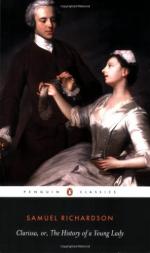Mrs. Smith was so taken with him, that she would fain have introduced him to the lady, not questioning but it would be very acceptable to her to see one who knew her and her friends so well. But this he declined for several reasons, as he call them; which he gave. One was, that persons of his cloth should be very cautious of the company they were in, especially where sex was concerned, and where a woman had slurred her reputation—[I wish I had been there when he gave himself these airs.] Another, that he was desired to inform himself of her present way of life, and who her visiters were; for, as to the praises Mrs. Smith gave the lady, he hinted, that she seemed to be a good-natured woman, and might (though for the lady’s sake he hoped not) be too partial and short-sighted to be trusted to, absolutely, in a concern of so high a nature as he intimated the task was which he had undertaken; nodding out words of doubtful import, and assuming airs of great significance (as I could gather) throughout the whole conversation. And when Mrs. Smith told him that the lady was in a very bad state of health, he gave a careless shrug—She may be very ill, says he: her disappointments must have touched her to the quick: but she is not bad enough, I dare say, yet, to atone for her very great lapse, and to expect to be forgiven by those whom she has so much disgraced.
A starched, conceited coxcomb! what would I give he had fallen in my way!
He departed, highly satisfied with himself, no doubt, and assured of Mrs. Smith’s great opinion of his sagacity and learning: but bid her not say any thing to the lady about him or his inquiries. And I, for very different reasons, enjoined the same thing.
I am glad, however, for her peace of mind’s sake, that they begin to think it behoves them to inquire about her.
LETTER LXXXII
Mr. Belford, to Robert Lovelace,
ESQ.
Friday, Aug. 11.
[Mr. Belford acquaints his friend with the generosity
of Lord M. and the
Ladies of his
family; and with the Lady’s grateful sentiments
upon
the occasion.
He says, that in hopes to avoid the pain of seeing
him, (Mr. Lovelace,)
she intends to
answer his letter of the 7th, though much against
her inclination.]
‘She took great notice,’ says Mr. Belford, ’of that passage in your’s, which makes necessary to the Divine pardon, the forgiveness of a person causelessly injured.
’Her grandfather, I find, has enabled her at eighteen years of age to make her will, and to devise great part of his estate to whom she pleases of the family, and the rest out of it (if she die single) at her own discretion; and this to create respect to her! as he apprehended that she would be envied: and she now resolves to set about making her will out of hand.’




